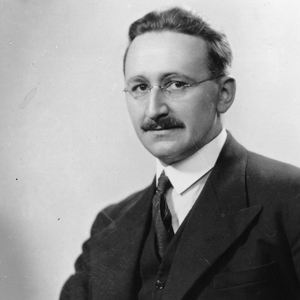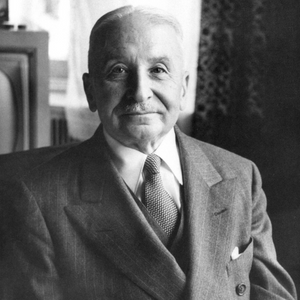Jerry L. Jordan
When free to do so, people will choose to use money as that entity that economizes best on the use of real resources to gain information about relative prices and to conduct transactions. The standard of value they prefer is one whose purchasing power over time is the same. That is, they make decisions in the expectation that all observed changes in prices are changes in relative prices and all changes in observed nominal interest rates are changing in real interest rates.
Over a decade before Frederick Hayek founded the Mont Pelerin Society, he had his “Eureka” moment while preparing a paper for delivery in London. He realized the best way to describe what we mean by “market” is the “mutualization of dispersed knowledge.” In a market, prices are an essential part of an information system. When the purchasing power of money is not known to be stable, a “noise” or static is introduced into this information system.

When the expectation of stable money is not met, mistakes are made, resources are misallocated, and economic growth is impaired. In many respects, people want to be able to “take for granted” that the medium of exchange means the same thing over time in the same way they expect that all measures of lengths, weights, and volumes are unchanging through time.
It is for these reasons that Section 8 of Article I of the US Constitution specifies that Congress shall coin money and regulate the value thereof, in the same clause that specifies that Congress shall establish the nation’s standards for weights and measures.
For most of my life, I never questioned the meaning of any measure of lengths, weights, or volumes, but then I lived for some time in a place—Mexico—where one could not take the meaning of volumes for granted. The first time I filled the 17-gallon-gas tank of my car and the gauge on the pump indicated I had just put in 23 gallons, I was totally mystified.
But, then a friend explained that because the Mexican government sets the price per liter of gasoline the same all over the nation, the gas station managers adjust the pumps so that the volume of gas indicated as 1 liter can vary considerably, from 100% to only 75 or 80% in other places. So, the true price reflects supply and demand, while the nominal price is controlled.
I doubt that the majority of people in developed countries would find uncertainty about the meaning of commonly used standards of weights, lengths, and volumes to be acceptable. So, the question is: why are people tolerant of uncertainty about the purchasing power of money over time? Why has it become acceptable for monetary authorities all around the world to announce that they intend to deliberately erode the purchasing power of the commonly-used standard of value and medium of exchange over time?
The answer has to be that the economists and politicians who advocate deliberate erosion of the purchasing power of money have persuaded the public that the benefits outweigh the costs. Economic textbooks used to teach that there was a permanent trade-off between unemployment and inflation. Even today there are politicians and their economic advisors who assert that “some” inflation is necessary in order to achieve or maintain a high level of employment. That idea has been proven to be wrong for over 1/2 century, but apparently far too many people still believe it.
Another argument in support of deliberate inflation has been that the alternatives are politically unacceptable; namely, that actions to control government spending or raise explicit taxes cause more grief for the politicians than does the implicit tax of debasing the national currency. This is in spite of much economic research that inflation is a highly divisive and a regressive form of taxation that tears at the social fabric of democratic governance.
None of this is new or unexpected. In drafting the US Constitution almost 2 1/2 centuries ago, James Madison worried that political fiscal authorities could not be disciplined by any means other than a specie standard of money. When asked how long the new American republican form of government would last, one of the founders—Benjamin Franklyn—replied: “When the people find that they can vote themselves money that will herald the end of the republic.”
And now, that is clearly where we are. If there were still uncertainty about this before the global pandemic, there can no longer be any doubt. There is not a shred of fiscal or monetary discipline anywhere to be seen. Without an externally-imposed monetary discipline such as the specie standard endorsed by James Madison, there is no reason for politicians to achieve and maintain fiscal discipline. In today’s world, monetary policy is just another fiscal instrument—a tool for transferring command over resources from the private sector to the government.
For well-known reasons, the inflation rate of the reserve currency in a fiat-money world sets the floor rate of inflation for the rest of the world. Historically, this has resulted in two possibilities: either the world adopts a new reserve currency—as when the US dollar replaced the British pound as the dominant reserve currency—or the political and monetary authorities of other countries gang-up on the politicians and monetary authorities of the reserve currency country and demand a change—as was the case when the high inflation in the 1970s during the failed presidency of Carter forced acceptance of Paul Volcker as a replacement for the hapless G. William Miller as head of the US Federal Reserve.
Nothing is certain in political affairs, but it is highly likely that we will once again hear well-reasoned calls for the “Special Drawing Rights” issued by the IMF to replace the US dollar as the world reserve currency. It is also probable we will hear renewed arguments for a “basket” of currencies—some variation of the BRIC—to become the new standard. All such proposals will have the same inherent weakness of the dollar—namely, they are politically created and managed fiat standards.
No doubt we will hear additional arguments for a return to the gold-exchange standard of the Bretton-Woods system, and even for a return to the pre-1914 gold standard that had prevailed at the time of the creation of the Federal Reserve System. But, history is quite clear that politicians and monetary authorities were quite quick to abandon those forms of discipline in times of perceived crisis or emergency, and there was no widespread popular demand for returning to monetary and fiscal discipline subsequently.
I have little doubt that if there had been any form of self-imposed monetary and/or fiscal discipline in place prior to the proclamation of a global crisis in the face of the pandemic, that it would have been abandoned by political leaders and welcomed by a majority of citizens. Even a ratified balanced-budget amendment to the constitution or a legislated monetary growth target would have been suspended or simply ignored.
The root of the problem, of course, is that national governments almost everywhere insist upon and enforce a monopoly of the medium of exchange employed by their citizens. This is normally made effective by the legal requirement that domestic taxes are assessed and paid only in the monopoly currency. Governments have been less successful in prohibitions of chosen standards-of-value, even when it has been illegal to hold that physical form of payment. The other and related problem has been that contracts specifying an alternative currency or an obligation to deliver something of value have not been enforceable in the national courts. An additional obstacle to competition among means of payment and stores of value has been the treatment of price changes of alternatives to the national currency as taxable events.
In Human Action, von Mises taught that “a money without a history is impossible.” As a standard of value, that is certainly true. Just as the Deutschmark was introduced as a fraction of the US dollar, and Federal Reserve Notes were initially defined in terms of gold, and later the Euro was simply a Deutschmark by another name, historical experience has been that familiarity with a medium of exchange has preceded evolution to a widely accepted standard of value.

I do not know which government-issued currencies, or cyber currencies, might emerge as most widely recognized and accepted as a universal standard of value and medium of exchange, but I do believe that open competition among alternative currencies is much more likely to produce a monetary unit that is stable over time than any creation of human design. True and lasting fiscal discipline can be achieved only when the most commonly—and maybe universally—used standard of value cannot be manipulated or somehow “managed” by political authorities and their appointees.
This view argues for removing the national and international barriers to free and open use of any monetary unit preferred by businesses and households—rather than advocacy of any specific monetary reform or new domestic or international institutional arrangements. High-confidence monies will dominate in an environment of unfettered competition. Monetary economists can add value by debating the ground rules of international monetary competition, rather than attempting to forecast the ultimate winners of such competition.
-Jerry L. Jordan was President of the Federal Reserve Bank of Cleveland, and a member of President Reagan’s Council of Economic Advisors.
